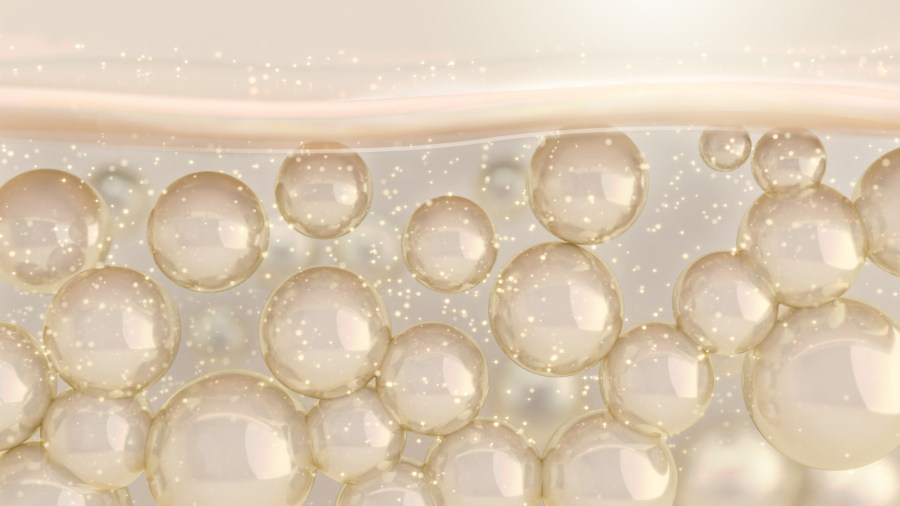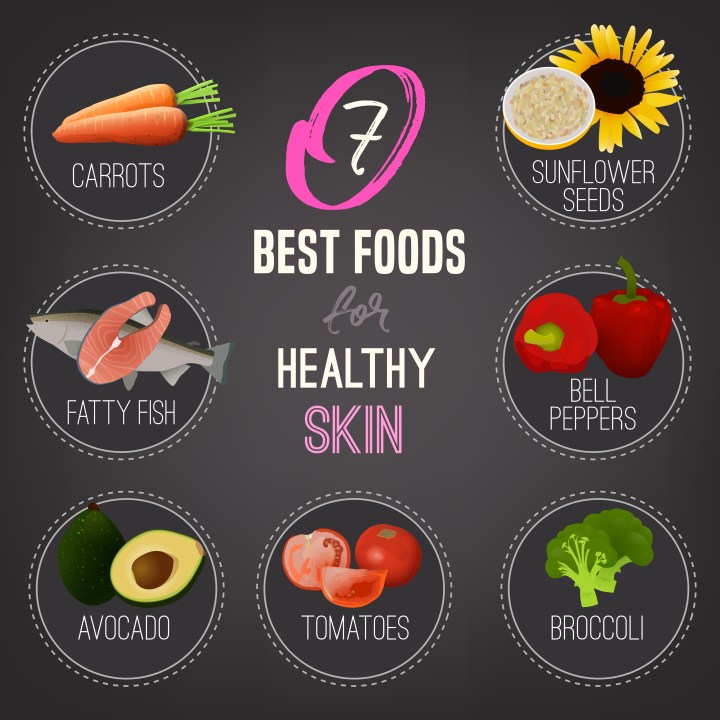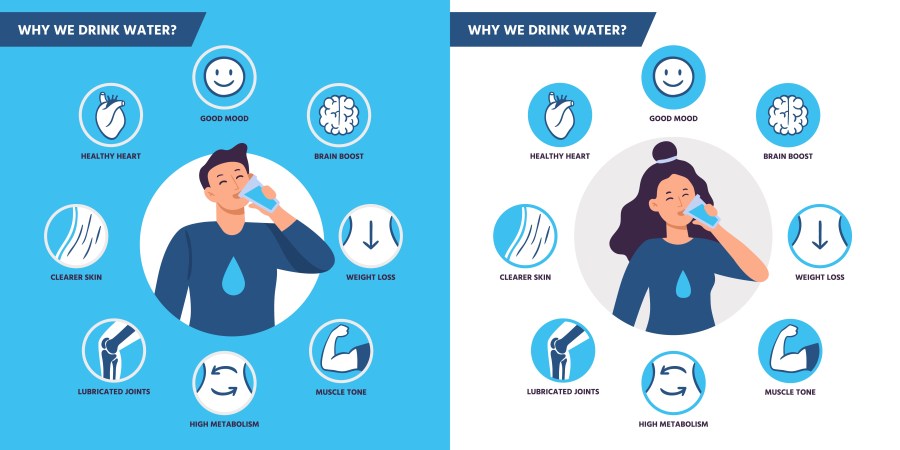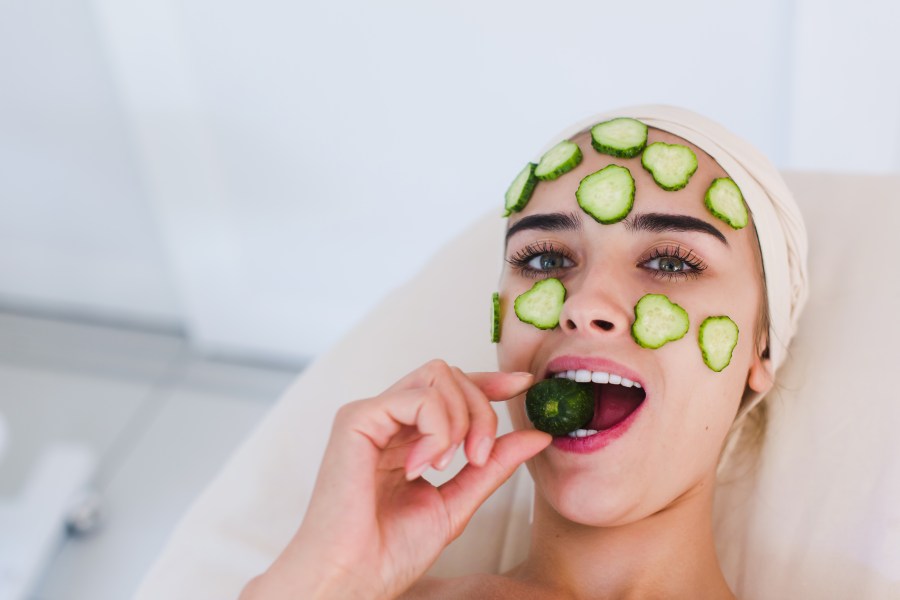Tampa (BLOOM) – Everyone wants healthy, glowing skin, but not everyone knows the secret to achieving it.
While there are countless skincare products available on the market, many fail to address the root cause of skin issues – nutrition. The food you eat can play a significant role in the health of your skin, as it is the source of the nutrients that your body needs to repair and maintain it. In this article, we will explore the connection between proper nutrition and skin health, and how making dietary changes can transform your skin from the inside out.
The Science Behind Skin Health

Before we dive into how nutrition impacts skin health, let’s first understand the structure of skin. Skin is the largest organ in the body and is made up of several layers, including the epidermis, dermis, and subcutaneous tissue. The epidermis is the outermost layer and acts as a barrier to protect the body from external elements. The dermis, located beneath the epidermis, contains connective tissue and blood vessels, while the subcutaneous tissue is the innermost layer and is responsible for regulating body temperature.
Several factors can affect skin health, including genetics, age, sun exposure, and lifestyle habits. Nutrition is another crucial factor that can impact the health and appearance of your skin. Eating a balanced diet can provide the necessary nutrients that your body needs to maintain healthy skin.
Nutrients for Skin Health
Certain nutrients are particularly important for skin health. Here are some of the key nutrients and their roles in skin health:
Vitamin A: Essential for skin repair and maintenance, vitamin A helps to keep skin smooth and healthy.
Vitamin C: A powerful antioxidant, vitamin C helps to protect skin from damage caused by free radicals, which can lead to premature aging.
Vitamin E: Another antioxidant, vitamin E helps to protect skin from sun damage and promotes healthy skin cell growth.
Zinc: Helps to regulate oil production and reduces inflammation, making it beneficial for acne-prone skin.
Selenium: Plays a key role in protecting skin from damage caused by the sun and environmental pollutants.
Antioxidants: Found in fruits, vegetables, and other plant-based foods, antioxidants help to protect skin from damage caused by free radicals.
Water: Proper hydration is crucial for skin health, as it helps to keep skin hydrated and supple.
Foods for Healthy Skin

Now that you know which nutrients are essential for skin health, let’s talk about the foods that can provide these nutrients.
Fruits and vegetables: Loaded with vitamins, minerals, and antioxidants, fruits and vegetables are an excellent source of nutrition for healthy skin. Some of the best options include leafy greens, berries, citrus fruits, and sweet potatoes.
Healthy fats: Essential fatty acids found in foods like salmon, avocado, and nuts can help to keep skin hydrated and reduce inflammation.
Lean protein: Protein is necessary for healthy skin cell growth and repair. Good sources of protein include chicken, fish, beans, and lentils.
Whole grains: High in fiber and nutrients, whole grains can help to reduce inflammation and promote healthy skin.
What Foods to Eat for Specific Nutrients
While a well-rounded diet is important for maintaining overall health, certain nutrients are especially beneficial for the skin.
Here are some specific foods and nutrients to include in your diet for healthy, glowing skin:
- Omega-3 Fatty Acids: Omega-3s are a type of healthy fat that can help to reduce inflammation in the body, which may help to improve certain skin conditions like acne and eczema. Good sources of omega-3s include fatty fish like salmon and sardines, as well as chia seeds, flaxseeds, and walnuts.
- Vitamin C: Vitamin C is an antioxidant that can help to protect the skin against damage from free radicals, which can contribute to premature aging. It also plays a role in collagen production, which is important for maintaining skin elasticity. Good sources of vitamin C include citrus fruits, strawberries, kiwi, bell peppers, and broccoli.
- Zinc: Zinc is a mineral that is important for healthy skin. It helps to regulate oil production and may help to reduce inflammation. Good sources of zinc include oysters, beef, pork, chicken, beans, and pumpkin seeds.
- Antioxidants: Antioxidants are compounds that can help to protect the skin against damage from free radicals. In addition to vitamin C, other antioxidants that are beneficial for the skin include vitamin E, selenium, and beta-carotene. Good sources of antioxidants include colorful fruits and vegetables like berries, leafy greens, carrots, and sweet potatoes.
- Water: Staying hydrated is important for maintaining healthy skin. Drinking enough water helps to keep the skin moisturized and may also help to reduce the appearance of fine lines and wrinkles. Aim for at least eight glasses of water per day, and more if you are physically active or live in a hot, dry climate.
By incorporating these foods and nutrients into your diet, you can help to support healthy, glowing skin. However, it’s important to remember that a balanced diet is key, and that no single food or nutrient can guarantee perfect skin.
The Importance of Hydration

Hydration is essential for healthy skin, and it’s often overlooked in discussions about diet and skincare. Drinking enough water helps to keep the skin hydrated, which can help to improve its overall appearance and function. When the skin is properly hydrated, it looks plump and healthy, and it’s better able to protect itself from environmental stressors like pollution and UV rays.
Dehydration, on the other hand, can lead to a number of skin issues. When the skin is dehydrated, it can look dull and tired, and it may be more prone to fine lines and wrinkles. Dehydration can also make the skin more vulnerable to irritation and inflammation, which can exacerbate conditions like acne and eczema. We have all seen those people who have skin like dried old leather. This is almost always because of too little hydration and too much sun over many years.
To ensure that your skin is properly hydrated, it’s important to drink enough water throughout the day. Experts recommend drinking at least eight glasses of water per day, although this can vary depending on your age, sex, weight, and activity level. You can also hydrate your skin from the outside by using a moisturizer that contains hydrating ingredients like hyaluronic acid, glycerin, or ceramides.
In addition to drinking water and using a hydrating moisturizer, there are other ways to promote hydration in the skin. Eating foods that are high in water content, such as watermelon, cucumber, and celery, can help to hydrate the skin from the inside out. Avoiding dehydrating beverages like alcohol and sugary drinks can also help to keep the skin hydrated.
Hydration is essential for healthy skin. By drinking enough water, using a hydrating moisturizer, and eating a diet that is rich in water-rich foods, you can help to keep your skin looking and feeling healthy and hydrated.
Foods to Avoid

Just as certain foods can promote healthy skin, others can harm it. Here are some of the foods that you should avoid if you want to maintain healthy, glowing skin:
Sugar and refined carbohydrates: Eating too much sugar and refined carbohydrates can cause inflammation in the body, which can lead to skin issues like acne and premature aging.
Processed foods: Processed foods are often high in salt, sugar, and unhealthy fats, which can lead to inflammation and skin issues.
Saturated and trans fats: Eating too much saturated and trans fats can lead to inflammation and clogged pores, which can cause acne and other skin issues.
Skincare Myths

There are countless skincare myths out there, and many of them are just that – myths. Here are a few examples:
Myth: Greasy foods cause acne: While it’s true that a diet high in unhealthy fats can contribute to acne, it’s not the grease itself that’s the problem. Instead, it’s the inflammation that these foods can cause in the body that can lead to acne.
Myth: Chocolate causes acne: Another common myth is that chocolate can cause acne. While there is some evidence to suggest that certain types of chocolate may worsen acne, it’s not the chocolate itself that’s the problem. Instead, it’s the sugar and milk that are often added to chocolate that can contribute to acne.
Myth: Tanning is good for the skin: Many people believe that getting a tan can help to improve the appearance of their skin, but this couldn’t be further from the truth. Tanning damages the skin and can lead to premature aging, wrinkles, and skin cancer.
Myth: Natural skincare products are always better than synthetic ones. Reality: While natural skincare products can be beneficial for the skin, not all natural ingredients are good for the skin, and not all synthetic ingredients are bad for the skin. In fact, many synthetic ingredients have been extensively tested and shown to be safe and effective for use in skincare products.
Myth: Exfoliating every day is good for the skin. Reality: While exfoliation can help to remove dead skin cells and improve skin texture, over-exfoliation can damage the skin barrier and lead to irritation, redness, and dryness. Experts generally recommend exfoliating no more than two or three times a week.
Myth: Pores can open and close. Reality: Pores do not have muscles and cannot open and close like a door. However, certain factors like heat, steam, and certain skincare products can help to temporarily loosen and remove debris from the pores.
Myth: Tanning beds are a safe way to get a tan. Reality: Tanning beds emit harmful ultraviolet (UV) radiation, which can damage the skin and increase the risk of skin cancer. According to the American Academy of Dermatology, using a tanning bed before the age of 35 can increase the risk of melanoma by 59%.
Myth: You only need sunscreen on sunny days. Reality: UV radiation can penetrate clouds and windows, and is present even on cloudy or overcast days. It’s important to wear sunscreen every day, even if you are not planning to spend a lot of time outside.
Debunking these skincare myths is essential, as it can help people make informed decisions about their skincare routines and diets.
Specific Dietary Recommendations for Common Skin Concerns

There are several common skin concerns that many people experience, including acne, dryness, and aging. Fortunately, there are specific dietary recommendations that can help to address these issues and promote healthy, glowing skin.
Acne: Acne is a common skin concern that affects people of all ages. While there are many factors that contribute to acne, diet can play a role. One dietary recommendation for acne-prone skin is to consume probiotics. Probiotics are beneficial bacteria that live in the gut and can help to improve digestion and boost the immune system. Studies have shown that consuming probiotics can help to reduce inflammation in the skin, which is a key factor in the development of acne. Probiotic-rich foods include yogurt, kefir, kombucha, and sauerkraut.
Dryness: Dry skin is a common concern, particularly during the winter months when the air is dry. To combat dryness, it’s important to consume foods that are rich in healthy fats. Omega-3 fatty acids, in particular, are beneficial for dry skin as they help to improve the skin’s natural barrier function and prevent moisture loss. Foods that are high in omega-3s include fatty fish like salmon and sardines, as well as nuts and seeds like chia seeds, flaxseeds, and walnuts.
Aging: Aging is a natural process that affects everyone, but there are certain dietary recommendations that can help to slow down the visible signs of aging. One important group of nutrients for anti-aging is antioxidants. Antioxidants are compounds that help to protect the skin from damage caused by free radicals, which are molecules that can damage cells and contribute to aging. Foods that are rich in antioxidants include berries, dark leafy greens, dark chocolate, and green tea.
In addition to these dietary recommendations, it’s important to maintain a balanced and varied diet that includes plenty of fruits, vegetables, whole grains, and lean protein sources. Getting enough sleep, managing stress, and avoiding smoking and excessive alcohol consumption can also help to promote healthy skin at any age. By incorporating these dietary recommendations and healthy lifestyle habits, you can help to promote healthy, glowing skin and address common skin concerns.
Proper nutrition plays a crucial role in transforming your skin from the inside out. By eating a balanced diet that is rich in vitamins, minerals, and antioxidants, you can help to maintain healthy, glowing skin. On the other hand, eating a diet that is high in sugar, unhealthy fats, and processed foods can lead to inflammation and skin issues. By making dietary changes and debunking skincare myths, you can achieve the healthy, glowing skin you’ve always wanted.
Sources and Experts:
- American Academy of Dermatology (AAD): The AAD is a professional organization for dermatologists in the United States. Their website provides a wealth of information on various skin conditions, as well as tips for maintaining healthy skin. They also offer a “Skin Health and Nutrition” fact sheet that explains the connection between diet and healthy skin.
- Dr. Whitney Bowe: Dr. Bowe is a board-certified dermatologist and clinical assistant professor of dermatology at the Icahn School of Medicine at Mount Sinai in New York City. She is also the author of “The Beauty of Dirty Skin,” a book that explores the connection between gut health and skin health. Dr. Bowe often speaks about the importance of a healthy diet for maintaining healthy skin.
- Dr. Rajani Katta: Dr. Katta is a board-certified dermatologist and clinical assistant professor of medicine at Baylor College of Medicine in Houston, Texas. She is also the author of “Glow: The Dermatologist’s Guide to a Whole Foods Younger Skin Diet,” a book that explores the connection between diet and skin health. Dr. Katta often speaks about the importance of nutrition for healthy skin.
- Harvard Health Publishing: Harvard Health Publishing is the consumer health arm of Harvard Medical School. Their website provides evidence-based health information, including a fact sheet on “Nutrition and Skin Health” that explains the connection between diet and healthy skin.
- National Institutes of Health (NIH): The NIH is a research organization that conducts and funds research on various health topics. Their website provides a database of research studies on the connection between diet and healthy skin. These studies can provide valuable insights on the topic.







